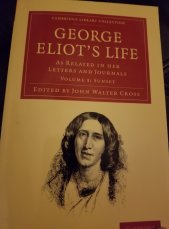 I am reading George Eliot’s journals and letters alongside her novel Daniel Deronda. In a letter dated the 29th of October, 1876, she describes to her friend Mrs. H.B. Stowe her surprise that Daniel Deronda has not met with more resistance because of its Jewish subject matter. She describes the shameful racism and bigotry she witnesses among her own class:
I am reading George Eliot’s journals and letters alongside her novel Daniel Deronda. In a letter dated the 29th of October, 1876, she describes to her friend Mrs. H.B. Stowe her surprise that Daniel Deronda has not met with more resistance because of its Jewish subject matter. She describes the shameful racism and bigotry she witnesses among her own class:
As to the Jewish element in ‘Deronda,’ I expected from first to last, in writing it, that it would create much stronger resistance, and even repulsion, than it has actually met with. But precisely because I felt that the usual attitude of Christians towards Jews is—I hardly know whether to say more impious or more stupid, when viewed in the light of their professed principles, I therefore felt urged to treat Jews with such sympathy and understanding as to my nature and knowledge could attain to. Moreover, not only towards the Jews, but towards all Oriental peoples with whom we English come in contact, a spirit of arrogance and contemptuous dictatorialness is observable which has become a national disgrace to us. There is nothing I could care more to do, if it were possible, than to rouse the imagination of men and women to a vision of human claims in those races of their fellow-men who most differ from them in customs and beliefs. But towards the Hebrews we western people, who have been reared in Christianity, have a peculiar debt, and, whether we acknowledge it or not, a peculiar thoroughness of fellowship in religious and moral sentiment. Can anything be more disgusting than to hear people called “educated” making small jokes about eating ham, and showing themselves empty of any real knowledge as to the relation of their own social and religious life to the history of the people they think themselves witty in insulting? They hardly know that Christ was a Jew. And I find men, educated, supposing that Christ spoke Greek. To my feeling, this deadness to the history which has prepared half our world for us, this inability to find interest in any form of life that is not clad in the same coat-tails and flounces as our own, lies very close to the worst kind of irreligion. The best that can be said of it is, that it is a sign of the intellectual narrowness—in plain English, the stupidity —which is still the average mark of our culture.
The U.K., of course, is not the only country in which racism, bigotry and xenophobia are a persistent, national problem . Eliot’s words are just as relevant today, unfortunately, for the culture of racism that the current leadership in the U.S. has incited which is horrifying, shameful and disgusting to witness. I am glad that Eliot does not mince words and calls it what it is—ignorance and stupidity.



God, how brilliant. No wonder MILL ON THE FLOSS was one of my first favorite classics.
LikeLiked by 2 people
She is truly brilliant and Daniel Deronda is fantastic!
LikeLike
I love the idea of “deadness to history” being tantamount to “irreligion”. It feels that way!
LikeLiked by 1 person
It really does feel that way!
LikeLike
Oh, I must get a copy of her letters/journals. If you are looking for critical works on Eliot, you might want to try Gertrude Himmelfarb’s Jewish Odyssey of George Eliot. I bought it a few years ago and plan on reading it when I’m done with Daniel Deronda.
LikeLiked by 1 person
Thanks so much, I will look for that.
LikeLike
Great post; I’d love to revisit DD but I have so many more Eliot novels to read first, as in most of them! In an interesting further turn of the screw related to the theme of this post, one major critical controversy over the novel came when Edward Said later described Daniel Deronda as a racist or at least imperialist novel for its advocacy of Zionism without thought for the existing population of the Middle East (just as Stowe’s own anti-racist liberation novel was later criticized, e.g. by James Baldwin, as indeed racist).
LikeLiked by 1 person
That’s very interesting about Said. Thanks for letting me know. I hope you get to read Middlemarch and Adam Bede, my two favorites so far.
LikeLike
You’re welcome! I have, luckily, read Middlemarch but not her other novels. (I was assigned to read her historical dramatic poem The Spanish Gypsy in a graduate course on the “long Victorian poem” too, but that, while very interesting, almost an imitation of Shakespeare and a timely story about conflicts among Jews, Christians, Roma, and Muslims, doesn’t seem to be too widely read.)
LikeLiked by 1 person
Its interesting that you mention that poem because she discusses it extensively in her letters and journals I am reading. She talks a lot about what makes a successful tragedy and it interested me enough to want to read it.
LikeLike
What a wonderful quote Melissa! Sentiments we could wish that everyone would adopt nowadays.
LikeLiked by 1 person
Thanks so much. The sentiments, unfortunately, are just as relevant today as they were in the 19th century.
LikeLiked by 1 person
Pingback: RBR Sunday Salon (1:1) | Roof Beam Reader
An excellent quote, though I am also inclined to believe Christ spoke Greek (in addition, of course, to vernacular and liturgical forms of Hebrew).
LikeLiked by 1 person